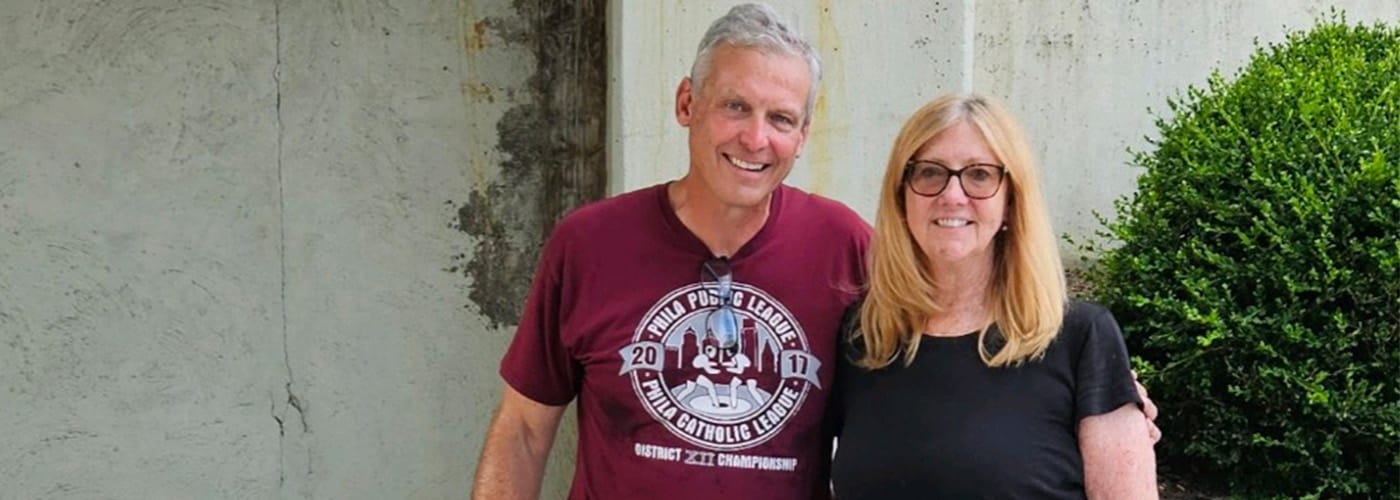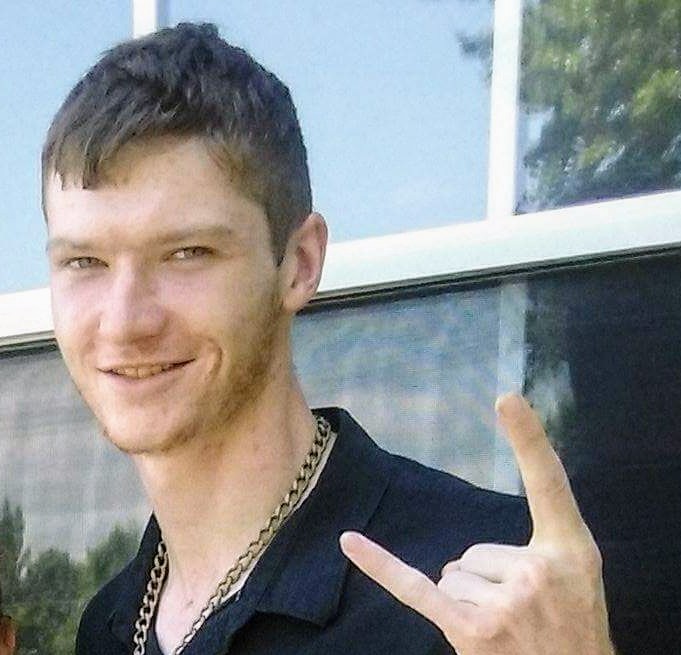Turning grief into action after losing their son to addiction

Brendan Arata was on the right track.
He had been sober for 96 days. He was writing music again. He got a job at UPS, helping drivers deliver packages for the holiday rush.
Brendan self-medicated for years before it turned into addiction. It started with stealing anxiety pills at home, then prescription opioids from his friend's dad before it escalated to heroin.
His 22-month battle with addiction was complicated by mental health issues and challenges navigating the path to recovery.
On the evening of his relapse, the 23-year-old overdosed on fentanyl-laced drugs.
But the tragic loss of Brendan set his parents, Heather and Larry Arata, on a mission to help others struggling with addiction.
The early years and a bipolar diagnosis
Brendan grew up in Havertown, Pa., in a lively household. "Our house was a house of total creativity," recalls his mother, Heather, a 64-year-old project manager. "While our daughter was drawing and sewing, Brendan was playing piano and percussion instruments."
Brendan and his older sister, Shelby, played sports, but Brendan's true love was music. He played xylophone in the elementary school band, co-hosted a weekly alternative rock radio show in high school, and eventually, got his own drum kit and began playing with the Blue Bond School of Music in Philadelphia.

At 15, Brendan began experiencing mental health issues and was diagnosed with bipolar disorder. Heather and Larry tried everything they could to help their son. But this was 2009 — and at that time, the importance of mental health wasn't as recognized as it is today.
"Finding resources then was difficult," says Heather. "It was trying to figure out how to treat the bipolar, find psychiatrists who understood the disorder in children his age and find a therapist he could talk to."
When he was around 16, Brendan was hospitalized in Bryn Mawr Hospital's Inpatient Psychiatric Unit, part of Main Line Health, for suicidal depression for the first time.
"With bipolar, there are many types of medications. We think that the medication Brendan landed on kept him stabilized from mania but made him feel more depressed. That's what we think led to self-medicating."
Battling addiction
A few years after graduating high school, Brendan began stealing a family member's anxiety medication as a way to find relief from his bipolar symptoms. Brendan and his best friend eventually began stealing opioids from the friend's father, who suffered from a chronic back condition.
It wasn't until that friend died from an overdose in February 2016 that the Aratas knew Brendan was using heroin.
Within one week, Brendan willingly entered rehab at Mirmont Treatment Center, part of Main Line Health. Mirmont Treatment Center specializes in addiction treatment for people with both substance use and mental health disorders.
Nearly 8 million adults in the United States have co-occurring mental health (like depression, anxiety, bipolar disorder or schizophrenia) and substance use disorders (like alcohol, drug or prescription medication, opioid addiction). It can be difficult to know which condition comes first, or whether one causes the other. But what's clear is that experiencing both can have an intensifying effect — which makes finding the right treatment even more critical.
"At that time, there were very few facilities that would accommodate someone with a dual diagnosis," says Heather. "But we always say he got excellent care at Mirmont Treatment Center."
"Addressing co-occurring mental health and addiction disorders requires a nuanced approach," explains Valerie Schina, MS, Executive Director of Mirmont Treatment Center. "Treating one condition alone isn't enough. At Mirmont Treatment Center, we emphasize integrated treatment plans that address both conditions simultaneously. This comprehensive approach includes therapy, medication, relapse prevention strategies and holistic support like stress management and family involvement. This type of care is crucial for long-term recovery."
After being discharged from Mirmont Treatment Center's inpatient rehab program, followed by outpatient addiction treatment, Brendan stayed sober for a while. He went home, got a job, committed to outpatient treatment and saw his therapist weekly.
But his struggles didn't end there. At one point, Brendan felt the urge to use again and sought readmission to Mirmont Treatment Center. Despite his urgent need for treatment, his health insurance company denied coverage because he wasn't under the influence at the time.
Recovery and relapse
In January 2017, things started to spiral. Brendan was hospitalized for suicidal depression several more times that year. After being again admitted to Bryn Mawr Hospital in September, he entered a partial hospitalization program (PHP) in Hamilton Township, N.J. Less intensive than inpatient hospitalization, a PHP can serve as a "step down" to help a person adjust to everyday life after they leave the hospital or rehab.
Brendan completed the PHP in November, then went to a recovery home in Jenkintown, Pa. But after two days, he called his family, saying he didn't feel safe there. Every time Brendan was discharged from treatment, the family felt a mix of hope and fear. Brendan wanted to get better, but the system at the time made it hard for him to stay on track.
"It was very frustrating as a parent not knowing where to turn," says Heather. "Many days, I just cried."
The Aratas brought Brendan home a few days before Thanksgiving, and he continued treatment, diligently attending an after-work outpatient program every day.
Despite all his efforts, Brendan relapsed on Saturday, Dec. 9, 2017. The drugs he took contained fentanyl, causing him to fatally overdose. He was 23.
A new purpose
The Aratas decided to channel their pain from losing Brendan into something positive. One month after their son passed away, Heather and Larry started the Opioid Crisis Action Network (OCAN), a non-profit focused on destigmatizing addiction and fighting for legislative changes to improve data transparency in recovery homes. They also raised money to help support individuals with rent in local best-practices recovery homes.
In January 2023, the Opioid Crisis Action Network Recovery Fund (OCAN-RF) expanded its mission to focus on charitable work. The program offers resources to people in recovery from drug or alcohol addiction, including up to eight weeks of recovery home rent, food access, public transportation passes and clothing gift cards. OCAN-RF currently provides assistance to more than 40 clients. It also holds weekly community outreach events, gives grants to local best-practices recovery homes and offers many alternative therapies, including recovery writing and artist workshops, trauma-informed yoga sessions, recovery meetings and gym memberships.
Additionally, Heather and Larry continue to advocate through legislation to prevent others from facing the same barriers to treatment Brendan did. Brendan's Bill (PA State Senate Bill 975) states that anyone presenting at a facility for treatment cannot be denied insurance coverage based on their sobriety status at the time of presentation. The Aratas encourage people to contact their state senators in support of Brendan's Bill.
But more than providing resources and advocating for lasting change in addiction treatment, the Aratas offer a beacon of hope for those battling addiction, and their loved ones. "It has been a healing experience," says Heather. "We'll never stop grieving the loss of Brendan, but seeing how many people we're able to help eases that grip of grief a little."
International Overdose Awareness Day is August 31 — but addiction affects individuals and families every day of the year. To learn how you can support the Opioid Crisis Action Network Recovery Fund, visit their website or Facebook page.
Next steps:
No one has to navigate this journey alone. Reach out to learn more about mental health and addiction treatment at Mirmont Treatment Center — we're here to help.
Learn about mental and behavioral health
 Content you want, delivered to your inbox
Content you want, delivered to your inbox
Want to get the latest health and wellness articles delivered right to your inbox?
Subscribe to the Well Ahead Newsletter.
